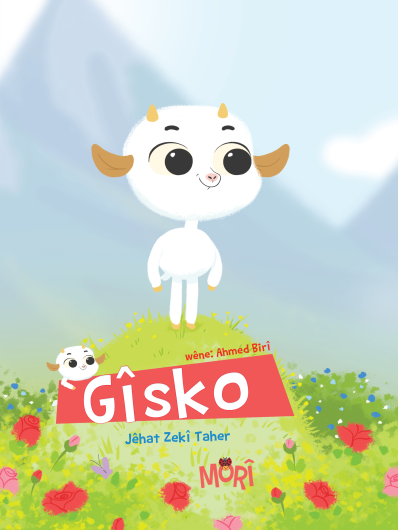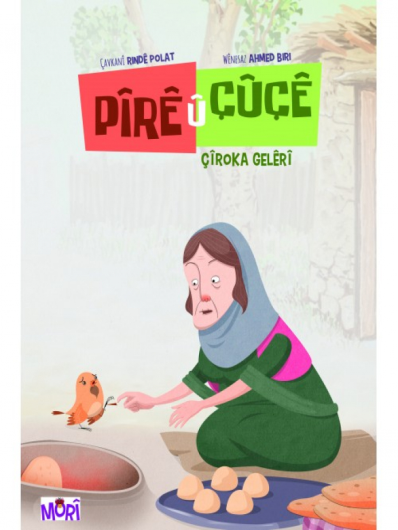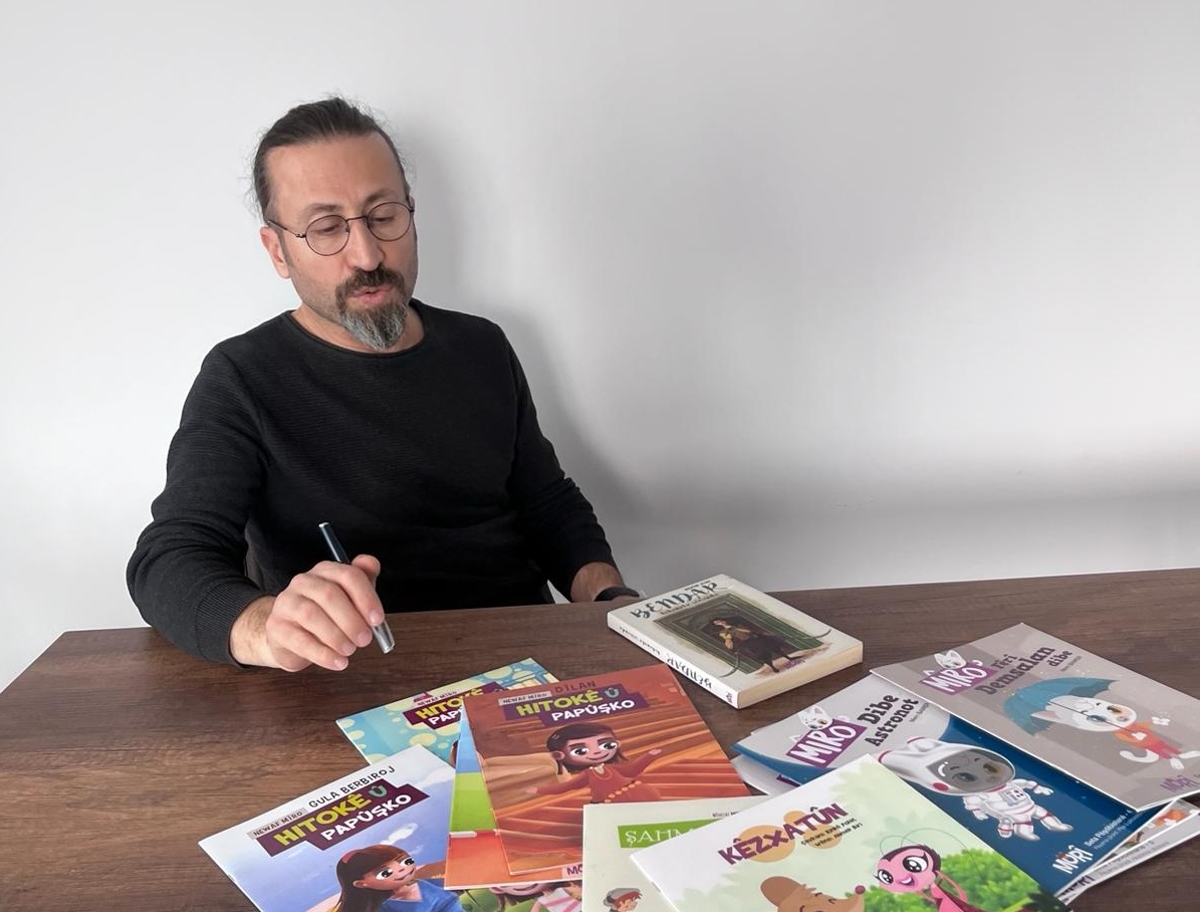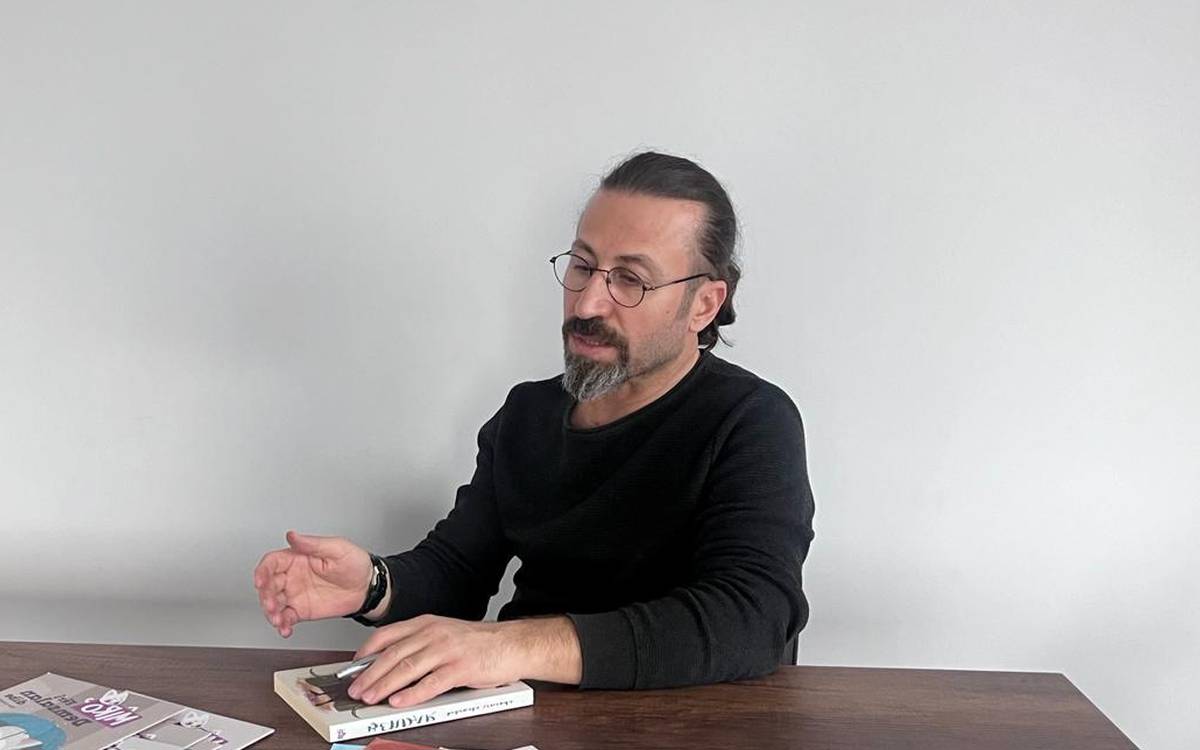Morî Publishing House, one of the few publishing houses that publish books on Kurdish children's literature, has recently been making remarkable efforts. Undertaking commendable initiatives for Kurdish children, the publishing house reaches out to authors in four parts of Kurdistan to bring their works to readers. Drawing from Kurdish culture, folklore, and oral literature, the publishing house has produced numerous works on fables. Additionally, they also introduce world classics of children's literature to Kurdish children. We spoke with Mem Bawer, the founder of Morî Publishing House, and one of its authors about the development, challenges, and needs of Kurdish children's literature on the occasion of February 21, International Mother Language Day.
Drawing attention to the discrimination faced by Kurdish-language publishing houses alongside the difficulties encountered by the Kurdish language itself, Bawer remarked, "While the Ministry of Culture makes book purchases twice a year for every book published by all publishing houses through the MASDE program to be provided to libraries, for some reason, books from Kurdish publishing houses are not purchased."
Responding to questions from the editors of BİA Children's Library, Bawer emphasized the importance of everyone contributing to ensure that Kurdish children have access to the necessary resources.

How did the idea of working on and publishing Kurdish children's literature start?
The idea of working on children's literature had always been in my mind. There was a significant gap in this field, and we wanted to fill that gap. After three poetry books, I can say that the valuable contribution of my friend Ridwan, who was involved in the cover design of my poetry book in 2013, encouraged me.
To bring my ideas to life, we initiated a collaborative effort. After a meeting with educators, artists, and writers, our idea was well received, and after the necessary formalities, we established our publishing house. After publishing 41 books in our first experience, we founded Mori Publishing House six months later since we couldn't agree on ideas in the field of children's literature. We are currently continuing our publishing journey in Diyarbakır.
"Different costs each time"
What difficulties do you face, what kind of challenges are there regarding Kurdish children's literature, and how is the literacy rate?
Actually, I can say that the biggest problem is assimilation and self-assimilation. First of all, we should start teaching our children their mother tongue at a young age so that both children's literature develops and children develop a consciousness of their own culture. There are families who are sensitive about this, of course, but their number is low.
In terms of publishing, we face many difficulties preparing children's books for printing. Illustrating these books, preparing their scenes, and since we print them on coated paper, we encounter different costs each time. In terms of distribution, especially in terms of overseas shipping, we experience some difficulties due to customs. We can understand the literacy rate through families who want to educate their children in their mother tongue at a young age within the family. Some European countries have free Kurdish education, so nurseries and kindergartens there occasionally request books from us. Also, in recent years, there has been a market due to children choosing Kurdish as an elective course. But the demand is not sufficient.
66 books published
In which dialects of Kurdish do you publish and how many books have you published so far?
We have published 66 books so far. However, some books consist of sets of five, six, or eight books, which are included in this number. Some of our books are composed of traditional stories related to Kurdish folklore. Stories from our childhood. Some of our books are also modern works written by authors themselves.
Some of our books are educational books for preschoolers. We also have books for language teaching. Finally, we have primarily translated original works from Persian, English, Spanish, Danish, French, and German into Kurdish for youth literature.

Although it may seem like a joke, there are still those in Turkey who believe or deny the existence of Kurdish as a language... What would you like to say about the richness, diversity, and depth of Kurdish language in children's and youth literature in this context?
Ignoring something doesn't make it disappear, of course. As I mentioned before, within Kurdish folklore, there has always been an oral storytelling tradition traditionally intertwined with the art of the 'dengbêjes', as well as long stories connected by events like fables, tales, and figures like Mîrza Mihemed. Our folk tales are rich and diverse. However, I would like to remind here that it is necessary to compile and preserve them as soon as possible. Because every time we lose an elderly grandfather or grandmother, we also lose their library of memories.
You expressed the abundance of the number of books you have published. Are there many writers and poets working on children's and youth literature in Kurdistan, or do you mainly rely on translations?
Unfortunately, we don't have many writers dealing with children's literature, and the number of our poets is even smaller. However, there are certainly individuals devoted to this cause. In recent years, we have received submissions from authors specifically for children's literature, but most of these submissions are not suitable for children from a pedagogical perspective, so we cannot publish them. That's why we first compile and publish our traditional stories. Then, as you mentioned, we publish translated books, which contribute significantly to the development of a language.
"We must first strengthen our foundation with children's literature"
Where do you position publishing in children's and young adult literature, especially in terms of the language of a people under restriction or oppression, and what significance does it hold?
I believe children's literature forms the foundation of national literature. Without establishing this foundation with strong books, no matter how many novels, stories, and poetry books we publish for adults, we cannot make progress. Therefore, we must first strengthen our foundation with children's literature to build a robust literature. Examples of this can be found worldwide. Many countries have realized the importance of children's literature late.
In the upcoming local election process, what do you expect local governments to do for publishing in the mother tongue?
There is already a past experience of Zarokistan (kindergartens opened by municipalities before the appointment of trustees in Diyarbakır). Previously, these preschool institutions provided education in Kurdish alongside English and music. The number of these schools can be increased in every neighborhood. If these institutions become operational, there will already be a need for children's books in this field. This will contribute to the development of publishing in the mother tongue.
"Apart from tax breaks, we do not benefit from any other incentives"
Publishing has become economically risky. Doesn't printing children's books in the Kurdish language, which is under pressure, put pressure on you? Do you benefit from incentives such as tax breaks provided by the government to publishers?
To be honest, we can't say we're doing very well economically. Because paper is purchased from abroad in euros or dollars, we encounter different prices each time, which makes our job difficult. First of all, I believe the policy of denial should be abandoned; something either exists or it doesn't. Honestly, we haven't faced any pressure in this regard so far. However, I can't say there is any support. While the Ministry of Culture makes biannual book purchases through the Masde program for libraries from all publishers, for some reason, book purchases are not made from Kurdish publishers. Tax breaks are already provided equally to everyone as a constitutional right. Apart from tax breaks, we do not benefit from any other incentives.
What age group do your books generally target, and how can they be obtained or accessed?
Our books target the age group of 0-18 years old. We have books for the age group of 0-3, which are books for the younger age group. For ages 4-6, there are folkloric or modern stories read to children by adults. We also have books for children aged 7-10 that they can read on their own, and finally, we have books for young adults aged 11-18. We have an official website, www.morizarok.com, where they can make purchases. Additionally, our books are available at local bookstores, especially in Diyarbakır. They can also obtain our books through many other websites and bookstores in various cities.

How do you evaluate the stance of the Kurdish public (in terms of writers, poets, politicians, and economic circles) regarding the Kurdish language, especially children's literature?
I see the attitude of writers towards children's literature as negative. While we have many talented story writers, they lack production specifically targeted towards children's literature. Poets, already deeply connected to poetry with passion, tend to overlook children's literature. In this regard, politicians have supported children's literature more, in my opinion; local governments have done some good initial work in the past. However, what matters is the sustainability of such efforts. Economic circles, albeit to a lesser extent, have supported children who choose Kurdish-language elective courses. As I mentioned, better initiatives can be undertaken locally. I believe that theater, kindergarten, and story workshops for children will contribute to the development of children's literature.
Who is Mem Bawer?
Poet, writer, publisher.
He was born in 1973 in the village of Safya in the district of Bismil, Diyarbakır. In 1997, he graduated from Dicle University with a degree in Classroom Teaching. His poems have been published in various magazines such as Jiyana Rewşen, Pelîn, Kevan, Kulîlka Ciwan, Tîgrîs, Pîtoresk, Kovara Wenda, and Kovara Hawara Botan. His critical essays have appeared in magazines such as Kovara W and Kovara Bîr, as well as in the newspaper Azadiya Welat. His two children's books titled "Mîro" were translated into Persian and published in Iran. In 2014, he co-founded Hîva Publishing House with three friends. After three years of work, he co-founded MORÎ Publishing House with his friend Rıdwan Polat in 2016, focusing solely on children's books.





